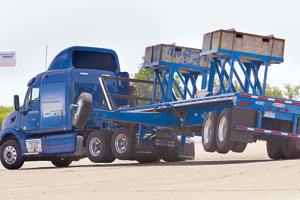US Orders Stability Control on New Tractors in 2017

This story appears in the June 8 print edition of Transport Topics.
The National Highway Traffic Safety Administration released its long-awaited final rule on electronic stability control, saying it will affect most new Classes 7-8 highway tractors in two years.
The rule mandates that trucks made on or after Aug. 1, 2017, have ESC systems to activate braking automatically to lessen swerving and rollover accidents.
The regulation also covers large buses but not heavy-duty straight trucks. There is no requirement for retrofitting.
“Electronic stability control, ESC, is a remarkable safety success story, a technology innovation that is already saving lives in passenger cars and light trucks,” Transportation Secretary Anthony Foxx said in announcing the rule June 3. “Requiring ESC on heavy trucks and large buses will bring that safety innovation to the largest vehicles on our highways, increasing safety for drivers and passengers of these vehicles and for all road users.”
“Ensuring the safety of America’s highways has always been ATA’s highest calling,” said Bill Graves, president of American Trucking Associations. “We’ve long known the positive role technology can play in making our vehicles and our roads safer. [The] announcement by NHTSA will reduce crashes on our highways and make our industry safer.”
NHTSA estimated ESC should add almost $550 to the cost of a tractor above anti-lock air brakes alone. People interviewed for this story said, on the condition of anonymity, that is probably not an accurate retail price but that $900 to $1,500 per truck is a good estimate.
Agency officials once considered issuing a rule for anti-rollover devices only but ultimately decided to include swerve-control technology. An ESC system must control swerve and rollover to comply with the rule.
Manufacturers and NHTSA agree that available technology will meet the rule’s standard. The two major producers of ESC systems, which are based on anti-lock air brakes, are Bendix Commercial Vehicle Systems and Meritor Wabco, the joint venture by Meritor Inc. and Wabco Holdings.
“We tested existing technology and based the rule on that,” NHTSA spokesman Derrell Lyles said. ESC systems have been on the market since 2005, although manufacturers have worked continuously to improve the software.
The two biggest ESC suppliers said steadily increasing sales prove the success of the devices.
“Every year, we’ve seen more and more fleets adopt electronic stability control,” said Fred Andersky, Bendix’s director of government and industry affairs. “ESC has been out for 10 years now . . . and if it didn’t work, they wouldn’t be buying it.”
While useful in its own right, ESC also is important as a gateway to even more advanced systems, said Alan Korn of Meritor Wabco. Just as ESC builds on anti-lock brakes, even more advanced systems are dependent upon ESC as a foundation, including active collision avoidance or mitigation and even autonomous trucks and truck platooning.
“This is part of the evolution of automation. We’re one more rung up the ladder,” Korn said.
Truck makers generally were pleased with the rule.
“We are still reviewing the final . . . rule on electronic stability control, but in general, we are pleased with it,” said Susan Alt, a senior vice president for Volvo Group in North America, parent of Volvo and Mack Trucks.
“We have promoted this technology in our own products since 2005, and we believe NHTSA’s mandate will make our highways safer,” Alt said.
Peterbilt Motors Co. already meets the standard.
“All heavy-duty Peterbilt models are standard with [Bendix] ESP,” company spokesman Derek Smith said.
Kenworth Trucks, like Peterbilt a part of Paccar Inc., uses ESP as an option, but it is not standard, spokesman Jeff Parietti said.
“[Daimler Trucks North America] supports NHTSA’s stability control rule,” said Sean Waters, DTNA’s regulatory affairs director.
“We look forward to working with NHTSA on future safety enhancements,” Waters said. Historically, DTNA has used Meritor Wabco as its supplier for ESC, and still does, but the company is emphasizing its in-house Detroit Assurance system that provides ESC and other services.
Navistar Inc. did not reply by press time for this issue.
One group that came out in opposition to the rule was the Owner-Operator Independent Drivers Association.
“Too many have become addicted to technology, or more precisely the promise, allure or maybe even the fascination of technology,” OOIDA Executive Vice President Todd Spencer said.
“While we are by no means opposed to technology, what we have become accustomed to seeing from government mandates is supposed justification that mirrors marketing claims,” he added. “If any of this really improves safety, that should be evident where the rubber meets the road. We simply don’t see it in the vast majority of instances.”

